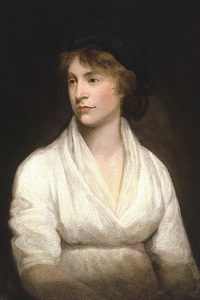Vindication of the Rights of Woman, Part 4
Written Text
from Chapter 11
The Prevailing Opinion of a Sexual Character Discussed
To account for, and excuse the tyranny of man, many ingenious arguments have been brought forward to prove, that the two sexes, in the acquirement of virtue, ought to aim at attaining a very different character: or, to speak explicitly, women are not allowed to have sufficient strength of mind to acquire what really deserves the name of virtue. Yet it should if then women are not a swarm of ephemeron triflers (5), why should they be kept in ignorance under the specious name of innocence? Men complain, and with reason, of the follies and caprices of our sex, when they do not keenly satirize our headstrong passions and groveling vices. -- Behold, I should answer, the natural effect of ignorance! The mind will ever be unstable that has only prejudices to rest on, and the current will run with destructive fury when there are no barriers to break its force. Women are told from their infancy, and taught by the example of their mothers, that a little knowledge of human weakness, justly termed cunning, softness of temper, outward obedience, and a scrupulous attention to a puerile kind of propriety, will obtain for them the protection of man; and should they be beautiful, everything else is needless, for, at least, twenty years of their lives.
Thus Milton describes our first frail mother; though when he tells us that women are formed for softness and sweet attractive grace (6), I cannot comprehend his meaning, unless, in the true Mahometan strain, he meant to deprive us of souls and insinuate that we were beings only designed by sweet attractive grace, and docile blind obedience, to gratify the senses of man when he can no longer soar on the wing of contemplation.
How grossly do they insult us who thus advise us only to render ourselves gentle, domestic brutes! For instance, the winning softness so warmly, and frequently, recommended, that governs by obeying. What childish expressions, and how insignificant is the being -- can it be an immortal one? Who will condescend to govern by such sinister methods! "Certainly," says Lord Bacon, "man is of kin to the beasts by his body; and if he be not of kin to God by his spirit, he is a base and ignoble creature!" (7) Men, indeed, appear to me to act in a very unphilosophical manner when they try to secure the good conduct of women by attempting to keep them always in a state of childhood. Rousseau was more consistent when he wished to stop the progress of reason in both sexes, for if men eat of the tree of knowledge, women will come in for a taste but, from the imperfect cultivation which their understandings now receive, they only attain a knowledge of evil.
Children, I grant, should be innocent; but when the epithet is applied to men, or women, it is but a civil term for weakness. For if it be allowed that women were destined by Providence to acquire human virtues, and by the exercise of their understandings, that stability of character which is the firmest ground to rest our future hopes upon, they must be permitted to turn to the fountain of light, and not forced to shape their course by the twinkling of a mere satellite. Milton, I grant, was of a very different opinion; for he only bends to the indefeasible right of beauty, though it would be difficult to render two passages which I now mean to contrast, consistent. But into similar inconsistencies are great men often led by their senses.







